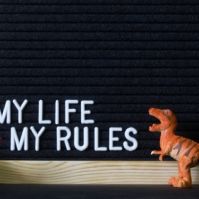 Positivity has an extreme impact on your life. According to the Mayo Clinic, positive thinking can improve your health and reduce stress. When you surround yourself with positive people, it can change your life. Positivity is not a Pollyanna attitude, where you ignore less pleasant situations. It’s just an approach to the unpleasantness of life that is more productive because you believe that the best will happen, not the worst.
Positivity has an extreme impact on your life. According to the Mayo Clinic, positive thinking can improve your health and reduce stress. When you surround yourself with positive people, it can change your life. Positivity is not a Pollyanna attitude, where you ignore less pleasant situations. It’s just an approach to the unpleasantness of life that is more productive because you believe that the best will happen, not the worst.
You can take this approach with people, too. Instead of thinking the worst about someone’s behavior, you give them the benefit of the doubt. It might not be easy to train your thinking to find positive alternative explanations, but it can definitely improve your attitude.
Imagine this scenario: You get cut off by a car when you’re trying to get on the highway. What do you think? Do you cuss and swear? Do you take out your anger on the next driver? What if the driver who cut you off was trying to get home to his young son who was home alone? Maybe the driver was trying to avoid getting hit by the car beside her? True, maybe the driver is a jerk who was only thinking about his or her own needs. But how you see the incident doesn’t change what happened. It only changes your mood. You’ll be happier and more confident.
Change Yourself
How can you learn to see the good in others and be more positive? Here are some ideas:
- Slow down.
Stop thinking negative thoughts. Acknowledge that the behavior was rude. Then, think about the good qualities of the person. Good people make mistakes. Try looking at the interaction through a different lens. - Look for positive intentions.
Ever been in a slow-moving checkout lane and gotten upset because it was taking so long? It’s okay. Everyone has been there. The person who is checking out has a lot of coupons, which take a long time to scan. Maybe that person is trying to be frugal out of necessity, not to be a bother. Maybe the cashier is in pain and doing her best. Maybe the cashier is new and is trying to prove himself without making a mistake. Consider the intentions of the other person before judging too harshly. - Remember that it’s not always personal.
Maybe your coworker who didn’t smile at you didn’t see you. It’s easy to go to the negative thought that he is mad at you. Don’t take everything personally. That driver wasn’t waiting for you to cut you off; you just happened to be in their way. - Recognize your own faults.
When you unfairly judge others, you’re setting yourself up to be unfairly judged. Maybe you are the one who didn’t see your friend at the park. Would you want him to be upset because you were paying attention to your kids? It could be you that cuts off a driver on the highway. What would you want her to think about you?
Looking For the Good in Others Is Scriptural
In Luke 19, the story of Zacchaeus is told. He was a wealthy tax collector, reportedly hated by everyone. Jesus invited himself to stay with Zacchaeus, who received Jesus gladly. In John 4, Jesus asked the woman of Samaria for water. Most people considered her worthless and an outcast. Jesus saw good in her. Simon Peter was impulsive, but Jesus chose him as the foundation of the church. Peter might have denied Jesus at the darkest hour, but Jesus still saw good in Peter.
Challenge yourself this week to look for the good in others when you get upset. Overlook little things with your friends and family. Be kind, even when you don’t have to be.



